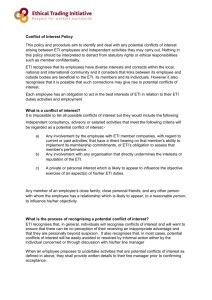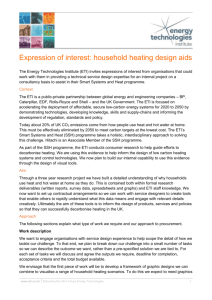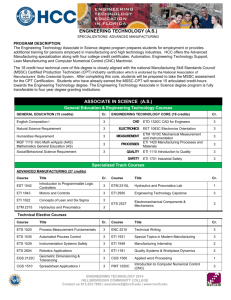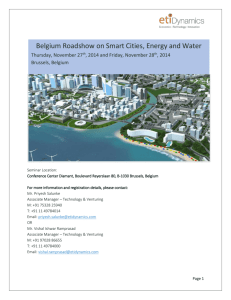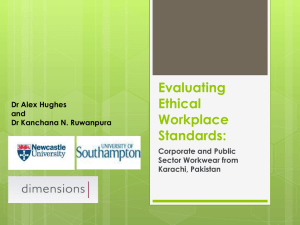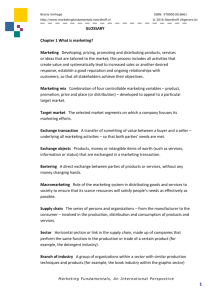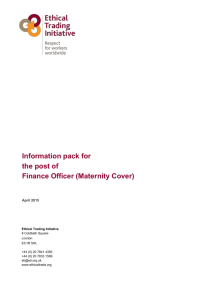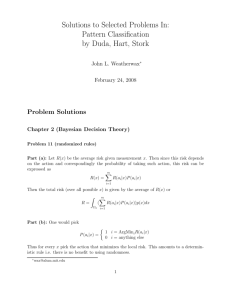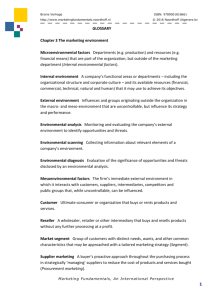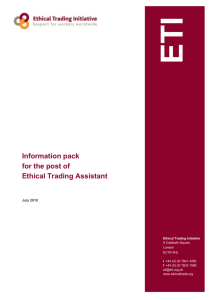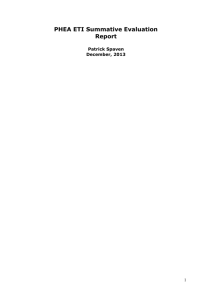Letter from Coordinator of NGO caucus of the ETI
advertisement
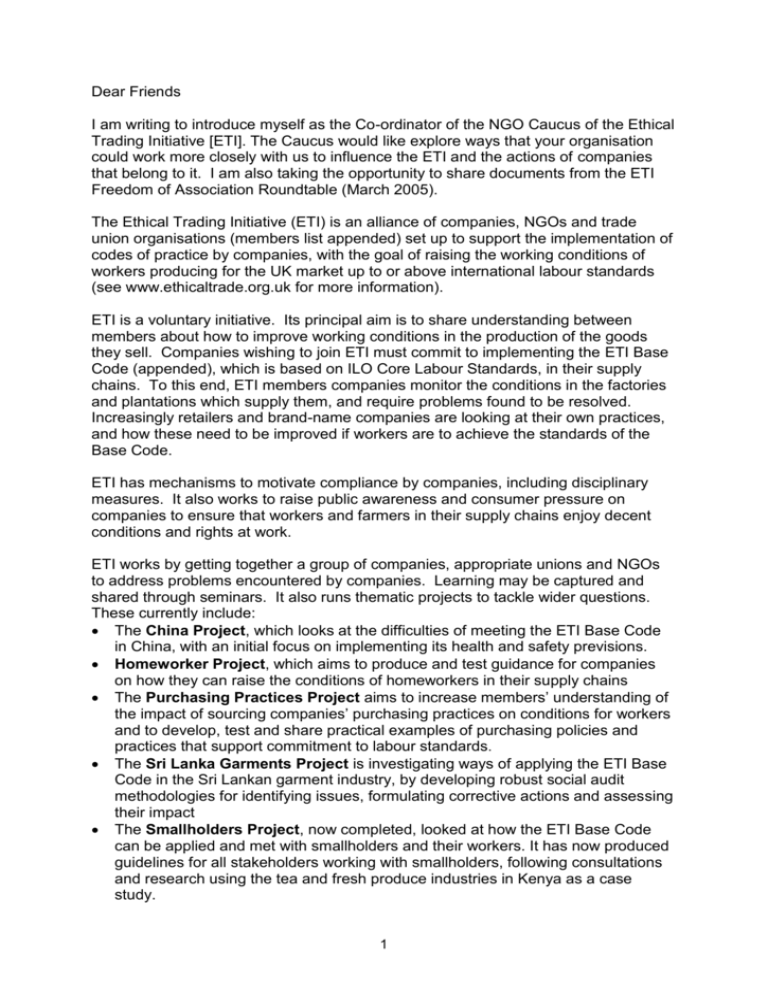
Dear Friends I am writing to introduce myself as the Co-ordinator of the NGO Caucus of the Ethical Trading Initiative [ETI]. The Caucus would like explore ways that your organisation could work more closely with us to influence the ETI and the actions of companies that belong to it. I am also taking the opportunity to share documents from the ETI Freedom of Association Roundtable (March 2005). The Ethical Trading Initiative (ETI) is an alliance of companies, NGOs and trade union organisations (members list appended) set up to support the implementation of codes of practice by companies, with the goal of raising the working conditions of workers producing for the UK market up to or above international labour standards (see www.ethicaltrade.org.uk for more information). ETI is a voluntary initiative. Its principal aim is to share understanding between members about how to improve working conditions in the production of the goods they sell. Companies wishing to join ETI must commit to implementing the ETI Base Code (appended), which is based on ILO Core Labour Standards, in their supply chains. To this end, ETI members companies monitor the conditions in the factories and plantations which supply them, and require problems found to be resolved. Increasingly retailers and brand-name companies are looking at their own practices, and how these need to be improved if workers are to achieve the standards of the Base Code. ETI has mechanisms to motivate compliance by companies, including disciplinary measures. It also works to raise public awareness and consumer pressure on companies to ensure that workers and farmers in their supply chains enjoy decent conditions and rights at work. ETI works by getting together a group of companies, appropriate unions and NGOs to address problems encountered by companies. Learning may be captured and shared through seminars. It also runs thematic projects to tackle wider questions. These currently include: The China Project, which looks at the difficulties of meeting the ETI Base Code in China, with an initial focus on implementing its health and safety previsions. Homeworker Project, which aims to produce and test guidance for companies on how they can raise the conditions of homeworkers in their supply chains The Purchasing Practices Project aims to increase members’ understanding of the impact of sourcing companies’ purchasing practices on conditions for workers and to develop, test and share practical examples of purchasing policies and practices that support commitment to labour standards. The Sri Lanka Garments Project is investigating ways of applying the ETI Base Code in the Sri Lankan garment industry, by developing robust social audit methodologies for identifying issues, formulating corrective actions and assessing their impact The Smallholders Project, now completed, looked at how the ETI Base Code can be applied and met with smallholders and their workers. It has now produced guidelines for all stakeholders working with smallholders, following consultations and research using the tea and fresh produce industries in Kenya as a case study. 1 The UK Agriculture (Gangmasters) Project looked at seasonal agricultural workers in the UK and helped establish the Gangmasters Licensing Authority, which is responsible for regulation of the industry to ensure seasonal workers employed by sub-contractors enjoy their legal rights and the standards of the Base Code. ETI member companies are supposed to establish a mechanism whereby workers in their supply chains can complain if they feel that their rights under the ETI Base Code or local legislation are not being respected. Many have not yet done so. The NGO members of ETI are organised into an informal caucus which meets four times a year, shortly before meetings of the ETI Board. The NGO Caucus seeks to maximise our influence on company practices by co-ordinating actions of NGOs and sharing and developing NGO positions. I have been caucus co-ordinator since late last year, taking over from Maggie Burns. We seek to work closely with the Trade Union caucus, both in projects and in the formulation of policies and strategies. One of the main demands of Southern trade union and NGO partners at the 2005 ETI Conference was for opportunities to influence debates within ETI. At the same time some ETI member companies would like to make contact with NGOs in producer countries for advice and briefings from NGOs on social issues or to assist with audits - for example as observers or to facilitate contacts with workers for confidential discussions away from the workplace. This email is a first step towards facilitating better communications between the ETI NGO Caucus and our grass-roots partners. It is an opportunity for you to influence ETI debates and also to avoid possible feelings of coercion or exploitation through engagement with ETI member companies which have sometimes arisen (see case studies below). There is a range of ways that your organisation could participate in ETI, around which we wish to open a dialogue. This might entail: Sharing information. Would you like to receive information from ETI, such as reports from Seminars and guidance documents? Consultations by the ETI Secretariat or the NGO Caucus about issues that relate to your area of expertise. If you would welcome such consultations, please let me know your geographical, thematic or issue-based areas of experience that might be relevant to international supply chains and ethical trade. Working with ETI member companies, singly or with groups of companies sourcing from a given sector. We are keen that Companies’ relationships with Southern NGOs should create opportunities for influencing company practice. Are you willing to be contacted directly by Companies, or should this be facilitated through the NGO Caucus or ETI Secretariat? Would you put any pre-conditions on working with companies? The experience of Southern NGOs of working with companies has been mixed, as is shown in the case studies which follow. We will try to ensure that any joint work with companies has positive outcomes for both parties. 2 Southern partners’ experience (good and bad) of working with ETI companies Africa Now (Kenya) Less happy experiences (WWW) Africa Now’s work with ETI companies has ETI NGO member Women Working had largely positive outcomes both for Worldwide has heard less happy company management and employees, experiences from Southern NGOs who including: have been contacted by ETI-member Employees and companies were made companies, seeking a briefing about the aware of labour laws (eg working hours, local labour rights situation. The main terms of employment, wages and benefits) complaints have been: and work toward complying with the same The company takes the information but Improved working conditions (health and safety, welfare, working hours); companies more sensitive to workers’ needs (e.g. light work for pregnant women, sick leave) An understanding of the supply chain by workers and the challenges that companies face in the process. Improved working relationship between ETI companies and employees Appreciation of the role of unions in solving problems between companies and employees. gives nothing in return The company maintains no dialogue around issues in their supply chains, and the NGO does not hear how, or if, it is addressing the problems they raised. Please get back in touch with your thoughts and reactions about how you feel your organisation could best contribute to ETI, whether in the ways I have sketched above, or otherwise, responding to the questions as appropriate. Two documents are attached from last year’s ETI Roundtable on Freedom of Association: the Seminar Report Freedom of Association & Collective Bargaining, and the ETI Briefing Freedom of Association and Collective Bargaining Guidance Document. We are sending them because Code implementation has been weakest around these critical issues (for workers’ ability to improve their conditions) where many companies are struggling and/or inactive. These documents indicate how clauses on Freedom of Association and Collective Bargaining can be implemented by companies. Any comments on these and how they relate to company actions in your area would be welcome. I would also like to remind you that the ETI NGO caucus is an additional communications channel which you can use to raise issues with ETI member companies or make formal complaints. You should contact me through the email address below. Best wishes Peter Williams ETI NGO Caucus Co-ordinator email: ngos@eti.org.uk mobile: +44 777 358 2213 3 Appendix – ETI Members (September 2006) Companies NGOs Asda Associated British Foods (Primark) Chiquita International Brands DCC Corporate Clothing Debenhams Retail Ethical Tea Partnership 1 Flamingo Holdings Fyffes Group Gap Inc Greencell Inditex Levi Strauss & Co Madison Hosiery Marks and Spencer Marshalls Monsoon Mothercare New Look Retailers Next Pentland Group Premier Foods Quantum Clothing Ringtons Rohan Designs Rombouts GB Sainsbury's Supermarkets Supremia Tesco The Body Shop International The Boots Group The Co-operative group (CWS) Typhoo Tea Union Coffee Roasters WH Smith WIBEDCO 2 William Lamb Footwear World Flowers Africa Now Anti-Slavery International CAFOD CARE International UK Central American Women's Network (CAWN) Christian Aid Fairtrade Foundation Home Workers Worldwide National Group on Homeworking Oxfam Quaker Peace and Social Witness (Religious Society of Friends) Save the Children Traidcraft Exchange Twin Trading Women Working Worldwide (WWW) 1 Trade unions International Confederation of Free Trade Unions International Textile, Garment and Leather Workers' Federation International Union of Food, Agricultural, Hotel, Restaurant, Catering, Tobacco and Allied Workers' Associations (IUF) Trades Union Congress The Ethical Tea Partnership is an association of tea packers comprising Accord Tea Services Ltd; Matthew Algie & Co Ltd; Bettys & Taylors of Harrogate Ltd.; DJ Miles & Co Ltd; Drie Mollen; Gold Crown; James Finlay Ltd; Imporient UK Ltd; Keith Spicer Ltd; Metropolitan Tea Co Ltd; The Nambarrie Tea Company Limited; Sara Lee; Tazo Tea; The Tetley Group; R Twining & Company Ltd; Unilever (Europe); Williamson Fine Teas Ltd; The Windmill Tea Co Ltd. 2 The Windward Islands Banana Development and Exporting Company. 4
